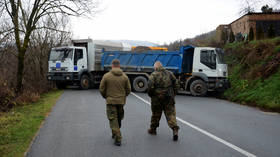Relations between EU and Serbia look like ‘marriage starting with adultery’ – Russia
Brussels offers Belgrade “bright future” while “committing anti-Serbian provocations,” a Russian Foreign Ministry spokeswoman said
The EU is betraying Serbia by offering the prospect of accession to Kosovo, Russian Foreign Ministry spokeswoman Maria Zakharova has said.
A summit between the bloc and Western Balkan states early this month has been followed by a spike in tensions between Serbia and Kosovo, she wrote in a Telegram post on Sunday, suggesting that Brussels’ actions may have played a role in aggravating the situation.
At the summit in the Albanian capital of Tirana on December 6, Brussels stated that both Serbia and its breakaway region of Kosovo have a “European perspective.” A week later, Kosovo authorities arrested an ethnic Serbian former police officer, sparking protests among Kosovo Serbs.
As tensions were still running high on the streets of Kosovo cities, its prime minister, Albin Kurti, formally applied for EU membership, Zakharova noted, adding that “a political process has been launched.”
A similar prospect of joining NATO allegedly prompted the former Georgian president, Mikhail Saakashvili, to attack Abkhazia and South Ossetia, as well as Russian peacekeepers stationed there back in 2008, Zakharova said, calling it an “inspired impunity mechanism” on the part of the West.
“The EU is leading Belgrade to a ‘bright future’ on one hand while committing anti-Serbian provocations with the other,” the Russian Foreign Ministry spokeswoman claimed. “This is betrayal from the outset,” she added, comparing relations between Brussels and Belgrade to “a marriage that starts with adultery.”
NATO seized Kosovo from Serbia in 1999, following the bombing of the country. The EU and US continue to support the breakaway region’s independence, which was unilaterally declared by Kosovo in 2008. Serbia continues to view the region as part of its territory.
The most recent standoff between Belgrade and Pristina follows a major deployment of ethnic Albanian police officers in areas populated by ethnic Serb majorities. It followed the arrest of an ex-cop accused of attacking an ethnically Albanian patrol. The escalation came just weeks after the EU persuaded Pristina to back down from a plan to ban Serbian license plates.
Belgrade has accused the West of ignoring the grievances of Kosovo Serbs and noticing them only “when they are on the barricades,” while also calling on Kosovo Serbs to remain peaceful and not rise to provocation. The current Kosovo government insists it can only discuss full recognition with Belgrade, something Serbia has continued to refuse.
You can share this story on social media:








Comments are closed.